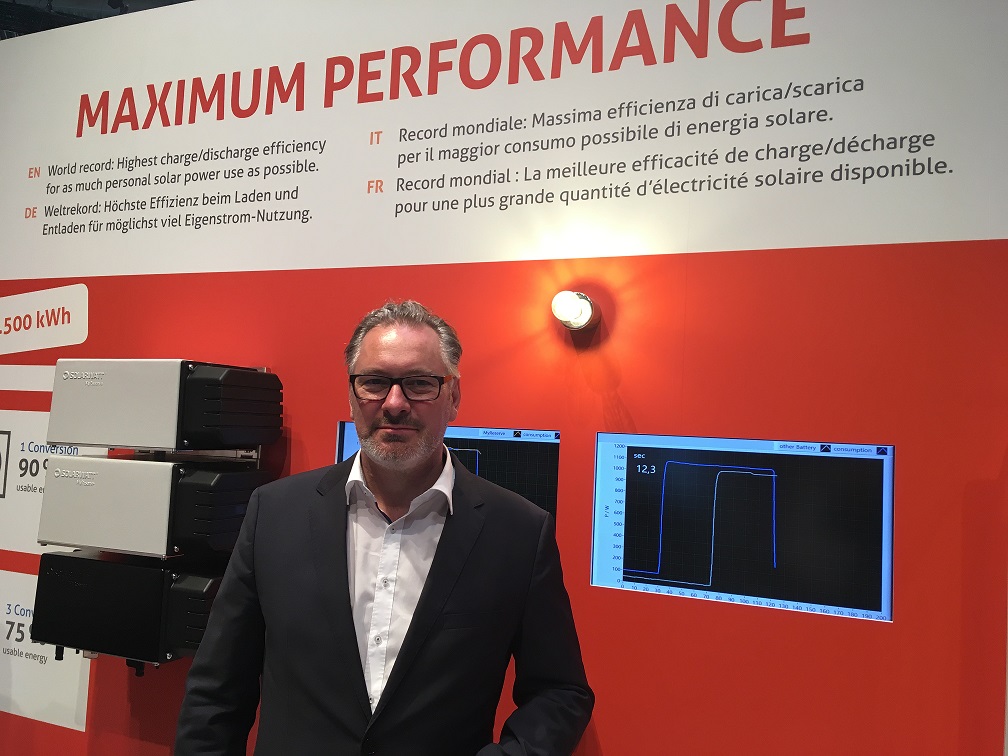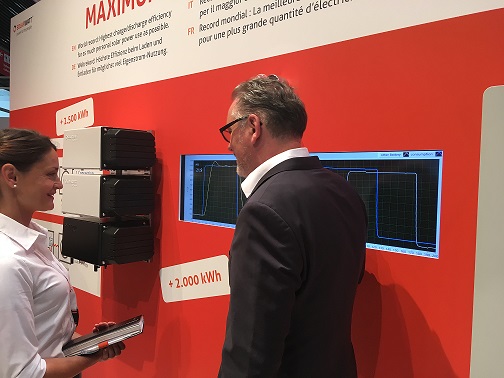
While still providing glass-glass PV modules into the solar market, Solarwatt has diversified into energy storage and solar-plus-storage, including the MyReserve Matrix modular battery system, which can be stacked to different sizes for commercial customers and a range of home storage units. While at Intersolar Europe/ees Europe this week, we caught up with Detlef Neuhaus, CEO of the Dresden-headquartered company who told us more about Solarwatt’s strategy, as well as offering up some candid views on wider industry topics.
Solarwatt is better known in solar as a module maker and energy storage is increasingly becoming a large part of the solar industry. How do you view that relationship between solar and storage?
Our roots are coming from modules but we changed our strategy seven years ago by stepping out of commodity-type PV plants and concentrating only on residential, small commercial. We’re beginning to become a system provider. What is a system? Our definition is producing (generation), which is modules, storing with our storage and managing with our energy manager. For all of that we have to build up the competencies in terms of people, of brains and all the production competences.
The connection between storage and PV is obvious. All the old arguments against PV, like: ‘The sun doesn’t shine at night’, well yes that’s true! Now we have a technical solution for that, which is storage.
Try Premium for just $1
- Full premium access for the first month at only $1
- Converts to an annual rate after 30 days unless cancelled
- Cancel anytime during the trial period
Premium Benefits
- Expert industry analysis and interviews
- Digital access to PV Tech Power journal
- Exclusive event discounts
Or get the full Premium subscription right away
Or continue reading this article for free
The technology is now on a level where from an economic point of view, it’s ok, it’s not fantastic. It brings you no business case in terms of earning more money from the PV plant on your roof but at least it isn’t damaging the benefit from your PV plant. It’s secure, easy to install. This combination with PV modules, storage and intelligent management systems is the base for decentralised green energy.
In terms of moving away from that commodity provision of equipment, solar ‘as-a-service’ and storage ‘as-a-service’ are becoming popular phrases in the industry right now. Is that something you too are moving towards?
We see different business models popping up everywhere. A couple of them are very interesting and might have a chance for success. Others are difficult, close to not being serious. We have thought about energy ‘as-a-service’, but we didn’t find a business model to add to our hardware and software that would add value for the installer and for us so at the moment we don’t offer those kinds of things.
Of course it could be ‘layered on’ by an outside provider. We knew from a while ago that this new energy world would be complicated, fragmented with a lot of new technologies, a lot of new business models. How do you react to that? You have two general choices: one is that you design everything for this way – whether it’s the right choice out of 10 other new business models, the other choice is to you try to be ready to add the solutions that really work, as they start to emerge. We went with the latter. Our interfaces are open for everything – every business model and technology you can think of can communicate with our energy manager with just a couple of software changes.
The virtual power plant (VPP) model is growing in the residential space. Have you had much proactive discussion of what that could mean for the business case for solar and storage?
Of course. But in terms of our core competencies which are in hardware and software, we have no experience as a utility business. We could try and get into that space and hire more people to investigate but instead we’re finding utilities to work with as partners to look at these business models. We are doing that with E.On and we will see…
If you turn back time five or six years and someone had told me the traditional utility business model would entirely collapse I would tell you that would never happen. But actually the utilities themselves know that is happening and they are working very hard to make a change. They have to learn a lot, regardless of how big and powerful they already are. But I think E.On is doing quite well.

This morning a representative of the European Commission said the continent needs to do more to support manufacturing of batteries across the whole value chain. Do you have a view on that, as a storage system manufacturer?
I think it’s very important, but Europeans are at the ‘back of the train’. There are already three large cell factories planned for Eastern Europe, all three are built by the big Asian companies. There’s a plan for a European one. What I can see is that there are in fact, three big plants beginning to be built and the Europeans are not on board!
We produce battery storage, so we buy in cells from SK and the intelligence, BMS, computer, design of the products we do in Germany. There are two main reasons for that: one is simple, volume. The markets are growing and developing but it’s not hundreds of millions, it’s a couple of thousand or 10,000. For that, you don’t produce something ‘wherever’. The second reason is a bit more strategic. The innovation speed of this product is that high that you have to be agile and react very quickly. How do you do that? If you are not producing, just assembling and you have to speak with many suppliers, adjusting or changing things all the time, it costs time.
To put that in production, as long as the innovation speed is that high on this level that you need close proximity between innovation, production, R&D and so on, so the reason to put it in Germany is very simple.
